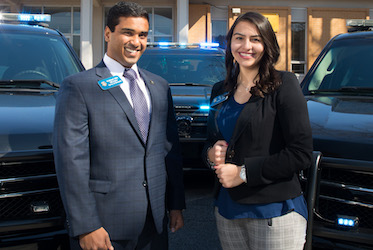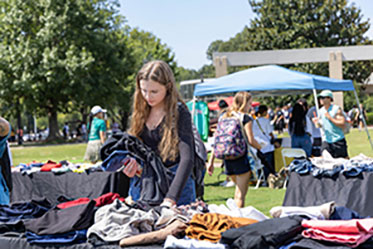
Criminal Justice Researchers Receive KSU’s First Spencer Grant
KENNESAW, Ga. | Jun 5, 2020
Criminal justice professors Jennifer McMahon-Howard, Heidi Scherer and James McCafferty are Kennesaw State University’s first recipients of a Spencer Foundation research grant, according to KSU’s Office of Research.
The Spencer Foundation is a leading supporter of education research, providing funding for projects that meet its criteria of being rigorous, relevant, equitable, collaborative and transformative. The grants are highly competitive, with less than 10 percent of the submitted proposals each year receiving funding, according to the Spencer Foundation’s website.
With their two-year Spencer grant, McMahon-Howard, Scherer and McCafferty will study and compare the views that public university students, faculty and staff have about campus carry laws in two of the 11 states that allow guns on campuses, Georgia and Tennessee. While many people have strong opinions about campus carry laws, McMahon-Howard said, the study will examine whether allowing guns on college campuses has had actual impacts on the learning environment – such as whether students feel more or less safe with guns on campus or if faculty members think differently about presenting controversial material in class that could spark impassioned responses from students.
“It’s a very heated topic. Many people feel very strongly on both sides of the issue,” said McMahon-Howard, assistant chair of KSU’s Department of Sociology and Criminal Justice. “With our research, our goal is not to advocate for or against laws that allow guns on campus. Instead, our goal is to examine the issue, using an unbiased approach, to determine if members of campus communities support campus carry laws, to see if they have experienced the laws as being helpful or harmful, and to identify potential costs and benefits of the laws.”
Since Georgia’s and Tennessee’s campus carry laws are written differently, the KSU researchers said, a focal point of the study will be evaluating whether perceptions about guns on campus are different in the two states. Tennessee’s campus carry law, adopted in 2016, enables only full-time employees to have a gun on campus, while Georgia’s law, enacted in 2017, allows anyone – faculty, staff, administrators, students and visitors – to carry on campus as long as they have the proper permit and comply with certain restrictions excluding permit holders from carrying in certain campus spaces.
The Kennesaw State professors pointed out that, despite so many strong opinions on the topic, very little research actually has been conducted on impacts that may be experienced after campus carry laws are put in effect. They look forward to sharing their findings not only with public universities in the states that allow guns on campus, but also making it available to policy makers in states that are considering adopting campus carry laws.
“As criminologists, we’re all very interested in the practical application of our research,” Scherer said. “We want to know if impacts from campus carry laws exist and, if so, what information can our research provide to help campuses navigate these impacts? So much is unknown on this subject, and we hope that our studies will lead to some new insights into this topic.”
McMahon-Howard, Scherer and McCafferty have conducted preliminary research on the impact of Georgia’s campus carry law and found that some members of the campus community experienced a slight increase in campus safety concerns after the law was enacted. Also, among faculty members they surveyed, about 30 percent said they tried to avoid controversial course material and discussions and 25 percent said they tried to avoid one-on-one meetings with students. Similarly, 20 percent of students reported altering their behavior, such as avoiding alternative viewpoints in class or being less inclined to take classes on campus at night.
“Although we’re not finding that the majority are reporting negative impacts,” McCafferty said, “there is still a notable proportion of faculty members and students who reported that guns on campus in some way have altered the way that they approach their coursework and the way that they engage with each other on campus.”
With funding from the Spencer Foundation, the researchers will be able to determine if similar results are found at universities in Tennessee.




















